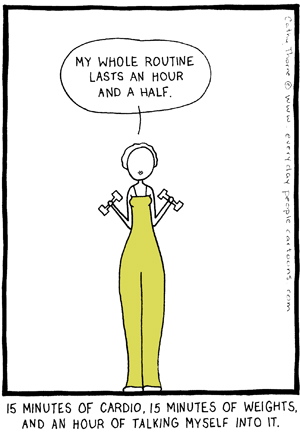If weight loss is your goal, you may have been discouraged by the amount of exercise you might need to commit to in order to make a meaningful difference. It’s the sort if thing that can put you off your workout altogether if you’re not careful. Not any more. This research seems to indicate that 30 minutes of exercise is just as effective as 60 minutes in promoting weight loss.
In a sample of 60 heavy – but healthy – men over 13 weeks, half the group were set to exercise for 60 minutes a day wearing a heart rate monitor and a calorie counter, whereas the half of the group only exercised for 30 minutes per day. Both halves of the group had to exercise enough to raise a sweat.
On average, those who exercised for 30 minutes per day lost 3.6kg over the 13 weeks – the average weight loss in the 60 minutes per day exercise group was 2.7kg. Actual fat mass was reduced by similar amounts for both groups – approximately 4kg. A bonus for the 30 minute a day group was that they seemed to burn more calories than expected for the training programme that was set for them. Another key factor was that there did not seem to be any statistically significant changes found in energy intake or non-exercise physical activity that could explain the different responses between the 30 mins v 60 mins exercise per day groups.
A few explanations were put forward by the Danish researchers, though we can’t be certain about any of them. Amongst them, they suggest that perhaps 30 minutes of exercise felt so ‘doable’ that the participants had energy left over to start exercising more intensely within their 30 minute allocation per day.
A feature of this research is that it focuses on a group of moderately but not severely overweight men – a group that now makes up 40% of the Danish male population. It certainly adds data to the general evidence that 30 minutes of aerobic exercise on most days – even if you break that up into smaller chunks – is a worthwhile and beneficial goal to set yourself.


